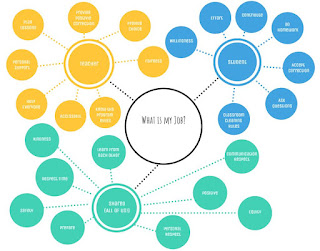TESL 0140 - Assessment Arguments
I will be honest. I have always liked traditional assessments because I feel that they are clear and hard to argue with. I like knowing where I am at and a grade or a percentage tells me that. What I have learned though, is that I also like alternatives in assessment, and the older I get the more I like a combination of the two in almost any environment.
Several years ago, our daughter was in grade 8 and the education system moved from a progress based assessment (more to the formative side) to an outcome based assessment (more focused on summative) and her grade significantly dropped from one school year (grade 7) to the next (grade 8). She was so angry about the change and felt like her grade 7 year was a waste in that she did not understand where she was "really at". We were all a little frustrated at the realization of what happened and she worked very hard to improve her knowledge and ensure that her outcomes met her standards. In discussion with the principal at the time, I mentioned that "real life" does not function on one or the other but both. In a job, you are assessed on a progress basis (formative) and on an outcome basis (summative). There is coaching/training support that supports development as a result of formative assessment and often merit increases, etc, are tied to outcome based/summative assessment (after probation, annually, etc). But in either case, both traditional and alternative assessments have a place in both the world of work and in the classroom.
When we look at the EAL world, I think there is a case to be made that we sprinkle classes liberally with formative assessments that support the learning competencies/multiple intelligences of the learners using both traditional and alternatives in assessment, and we support outcomes when needed with summative assessments that are credible in both traditional and alternative ways.
I have made a list for myself of some of the key benefits and challenges of each for reference when it is time for me to work on selecting or creating assessments for my class.
Several years ago, our daughter was in grade 8 and the education system moved from a progress based assessment (more to the formative side) to an outcome based assessment (more focused on summative) and her grade significantly dropped from one school year (grade 7) to the next (grade 8). She was so angry about the change and felt like her grade 7 year was a waste in that she did not understand where she was "really at". We were all a little frustrated at the realization of what happened and she worked very hard to improve her knowledge and ensure that her outcomes met her standards. In discussion with the principal at the time, I mentioned that "real life" does not function on one or the other but both. In a job, you are assessed on a progress basis (formative) and on an outcome basis (summative). There is coaching/training support that supports development as a result of formative assessment and often merit increases, etc, are tied to outcome based/summative assessment (after probation, annually, etc). But in either case, both traditional and alternative assessments have a place in both the world of work and in the classroom.
When we look at the EAL world, I think there is a case to be made that we sprinkle classes liberally with formative assessments that support the learning competencies/multiple intelligences of the learners using both traditional and alternatives in assessment, and we support outcomes when needed with summative assessments that are credible in both traditional and alternative ways.
I have made a list for myself of some of the key benefits and challenges of each for reference when it is time for me to work on selecting or creating assessments for my class.
Traditional Assessments
Benefits: practicality, reliability, validity, built externally so no teacher time is taken, standardized, objective, takes less time, clear outcome/score/grade
Challenges: less valuable washback, lack authenticity, generally mostly summative, depends on external/extrinsic motivations, may lack context, may struggle with transfer of learning (focus is often on "teaching to the test"
Alternatives in Assessment
Benefits: a wide variety of options, supportive of student learning, authenticity, increased useful washback, supports individual learning, integrates all 4 language areas, supports intrinsic motivation, content validity (close to authenticity), supports multiple intelligences (demonstrations of performance/competence in more than one way to support more learners)
Challenges: standardization, more effort on the part of the teacher to both create and administer valid assessments, requires that the teacher has solid knowledge of accepted criteria for creating assessments

Comments
Post a Comment